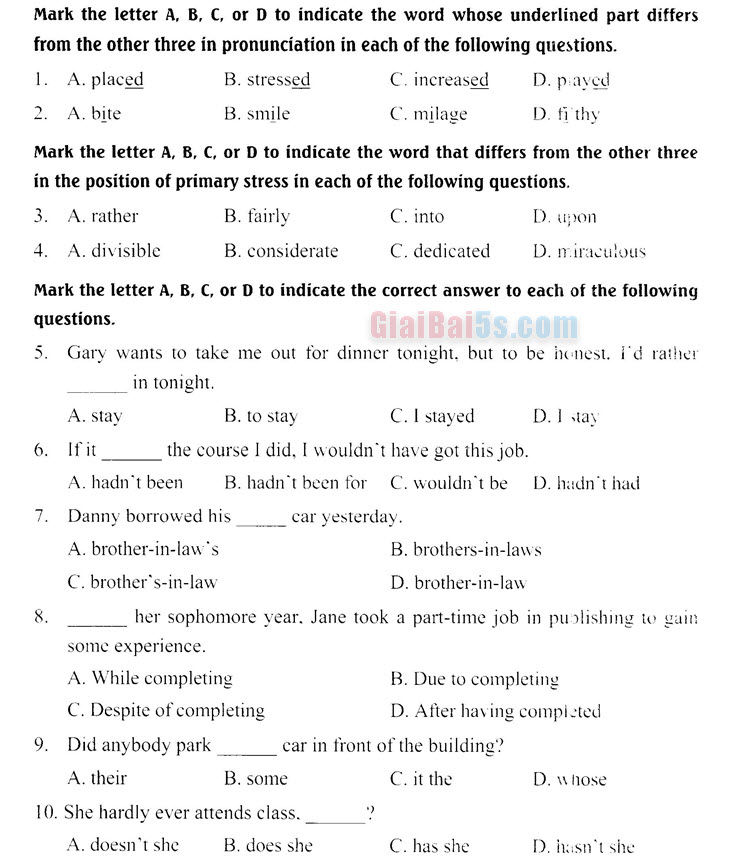
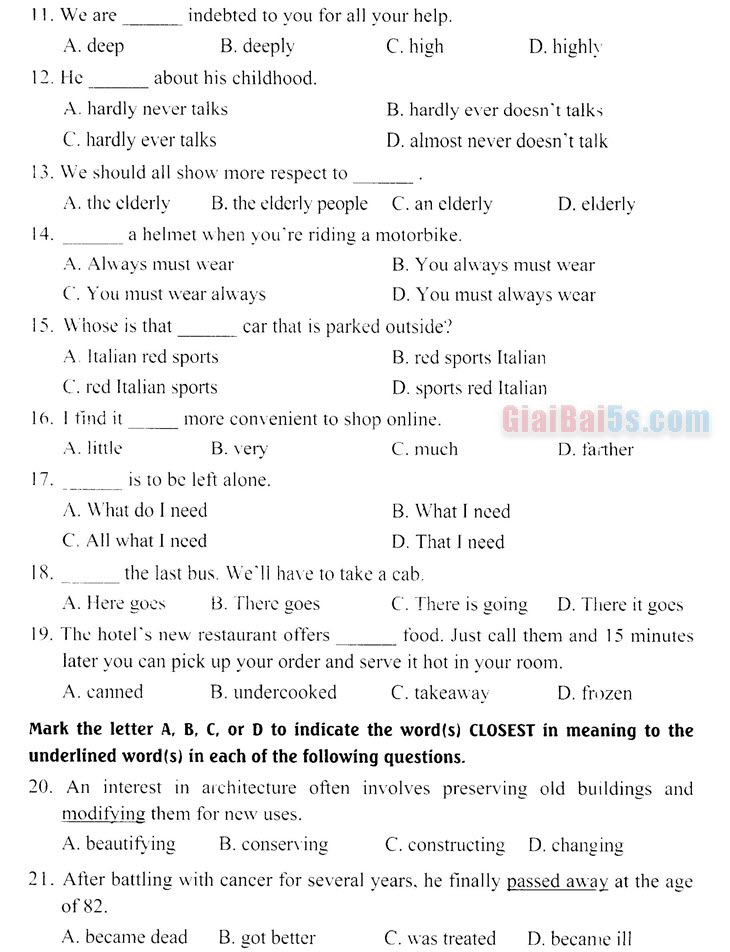
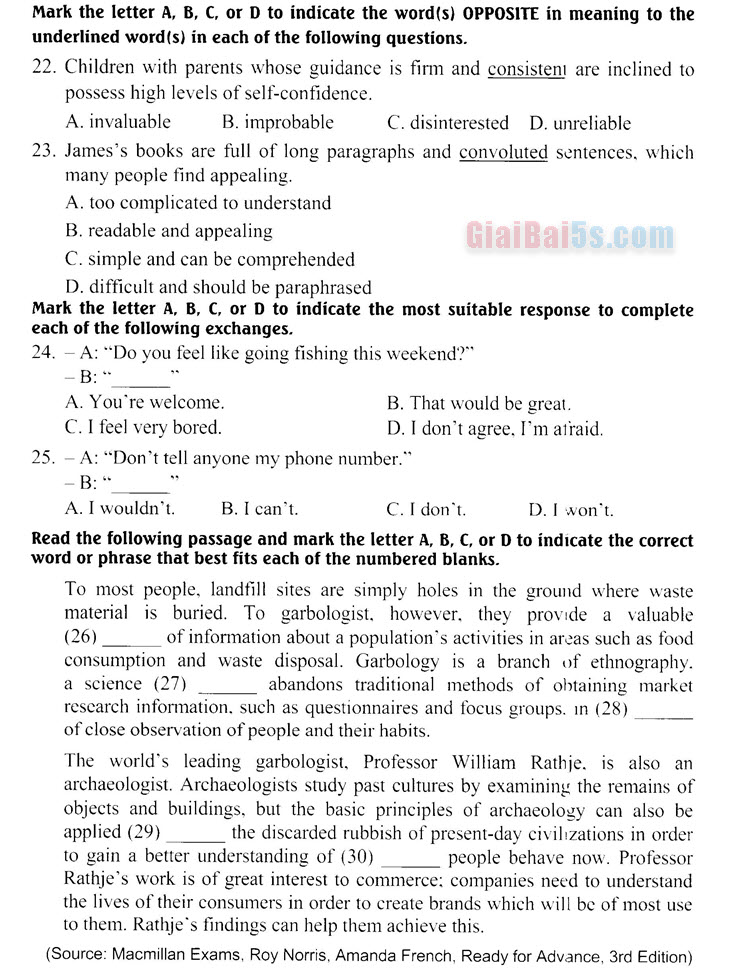
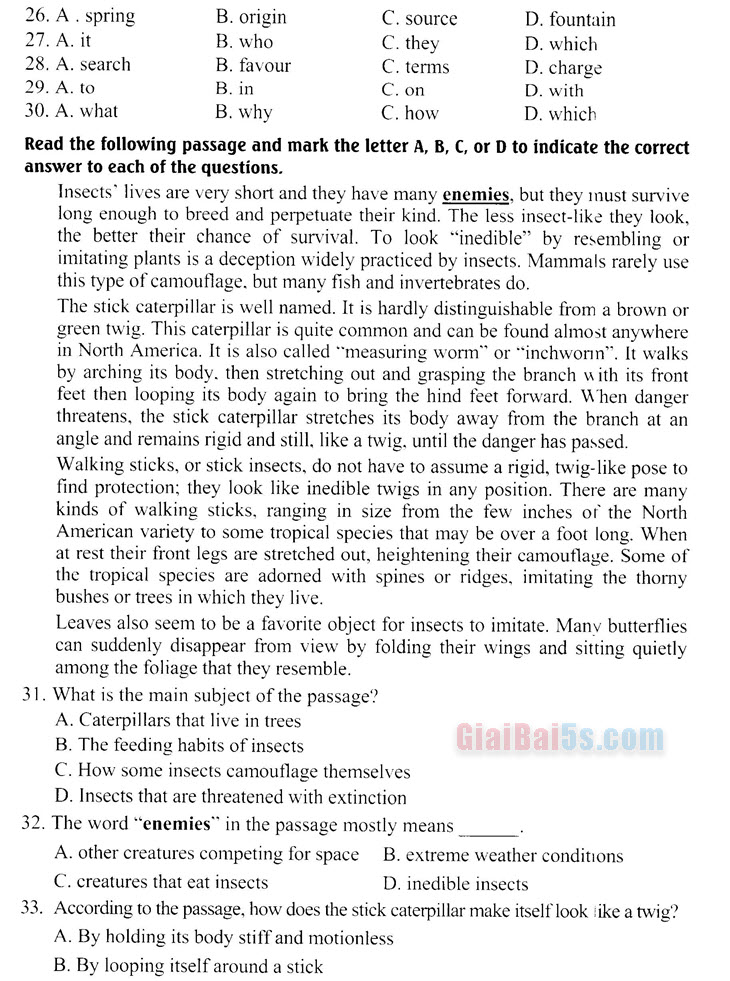
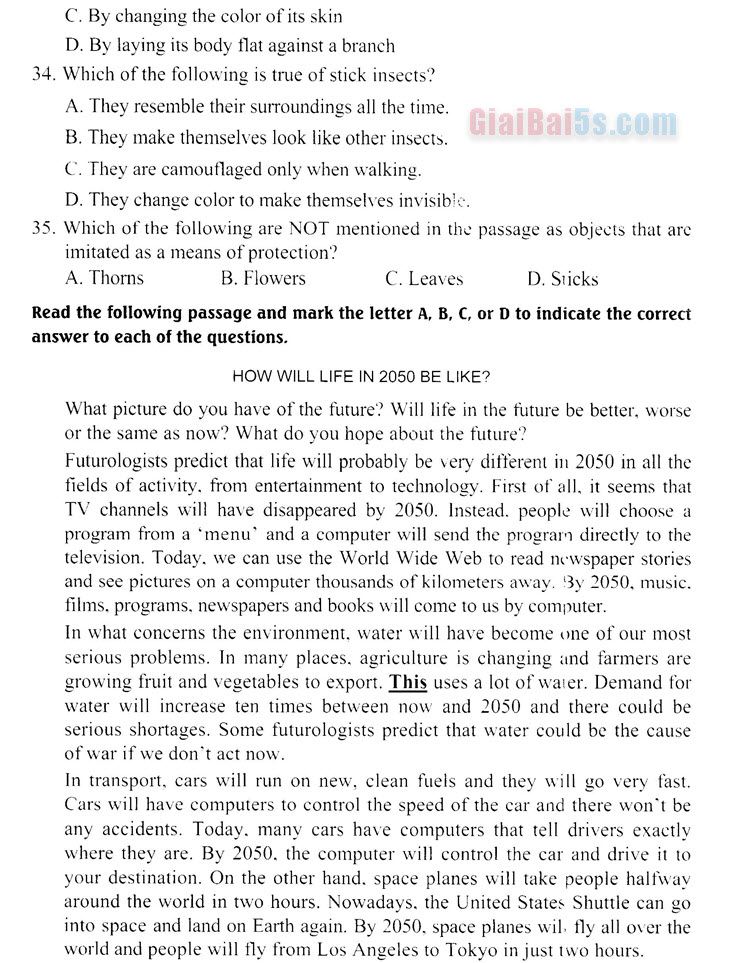
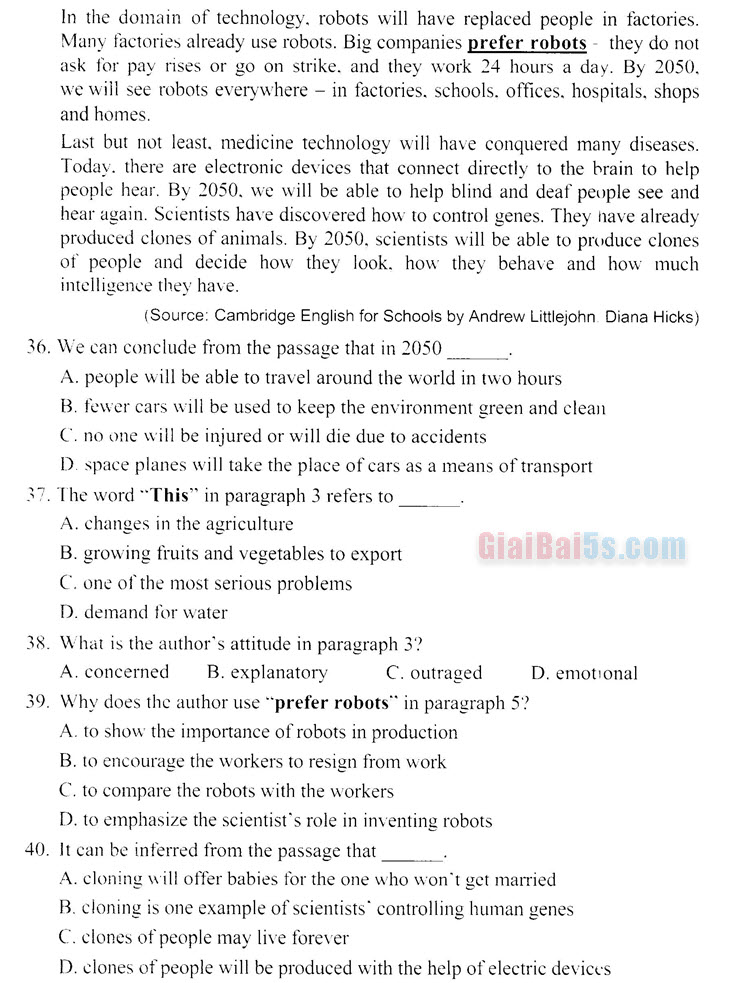
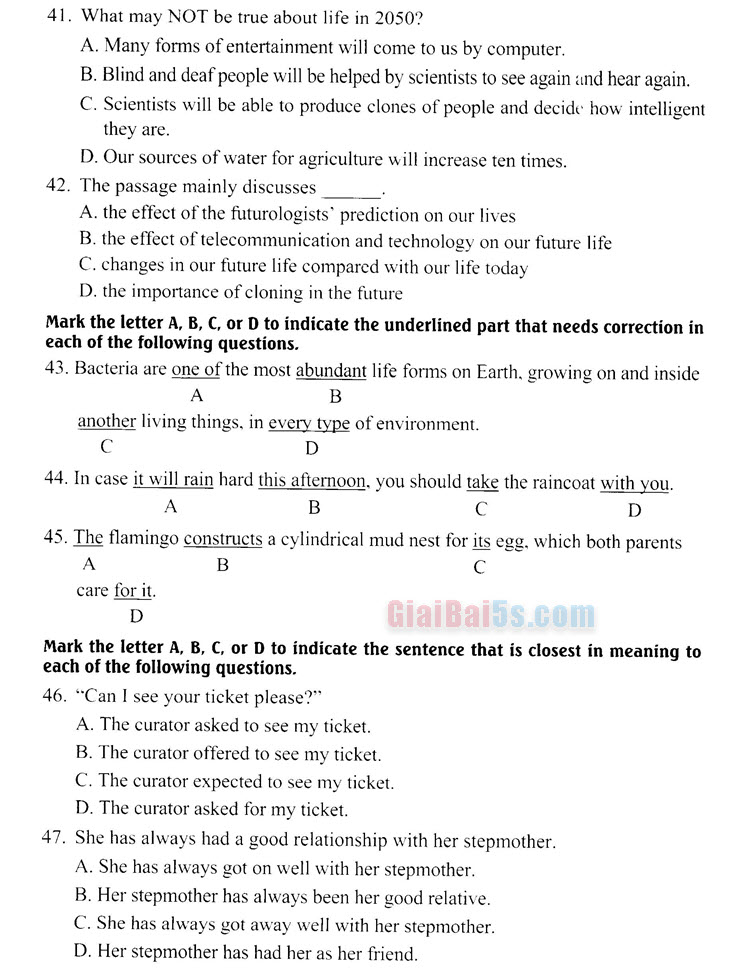
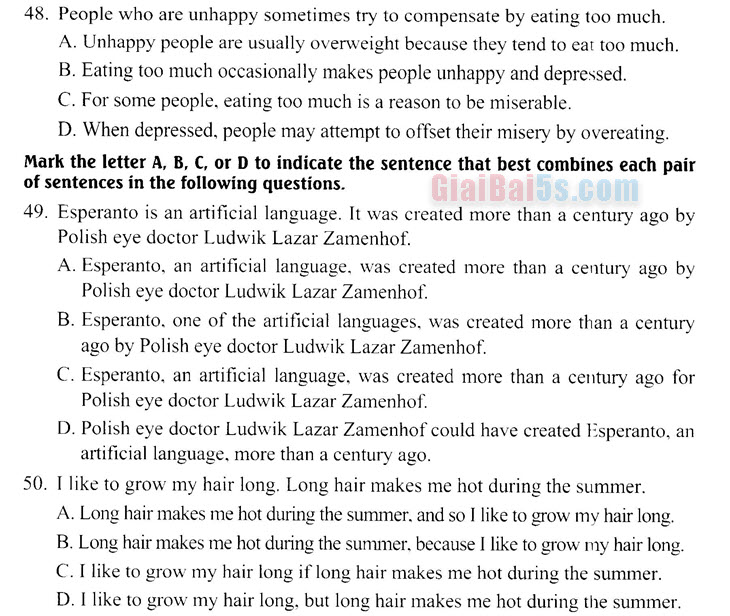

Nguồn website giaibai5s.com
Mark the letter A, B, C, or D to indicate the word whose underlined part differs from the other three in pronunciation in each of the following questions. 1. A. placed B. stressed C. increased D.payed 2. A. bite
smile
milage D. fī thy
Mark the letter A, B, C, or D to indicate the word that differs from the other three in the position of primary stress in each of the following questions, 3. A. rather
fairly
into
pon 4. A. divisible B. considerate C. dedicated D. miraculous
.. 11
Lli
Mark the letter A, B, C, or D to indicate the correct answer to each of the following questions.
Gary wants to take me out for dinner tonight, but to be honest. I’d rather
in tonight A. stay B. to stay
I stayed D. I tay 6. If it _ the course I did, I wouldn’t have got this job.
hadn’t been B . hadn’t been for C. wouldn’t be D. hadn’t had 7. Danny borrowed hiscar yesterday. A. brother-in-law’s
brothers-in-laws C. brother’s-in-law
brother-in-law 8. _ her sophomore year, Jane took a part-time job in publishing to gain
some experience. A. While completing
Due to completing C. Despite of completing
After having completed 9. Did anybody park_ car in front of the building? A. their B. some
it the
whose 10. She hardly ever attends class,
doesn’t she B. does she C. has she D. inusn’t she
We are indebted to you for all your help.
deep B. deeply C. high D. highly 12. He about his childhood. A. hardly never talks
hardly ever doesn’t talks C. hardly ever talks
almost never doesn’t talk 13. We should all show more respect to
the elderly B. the elderly people C. an elderly D. elderly 14. a helmet when you’re riding a motorbike. A. Always must wear
You always must wear C. You must wear always
You must always wear 15. Whose is that car that is parked outside? A Italian red sports
red sports Italian C. red Italian sports
sports red Italian 16. I tind it more convenient to shop online. A. little B. very
much
farther 17. is to be left alone. A. What do I need
What I need C. All what I need
That I need 18. the last bus. We’ll have to take a cab.
Here goes B. There goes C. There is going D. There it goes 19. The hotel’s new restaurant offers food. Just call them and 15 minutes
later you can pick up your order and serve it hot in your room. A. canned B. undercooked C. takeaway D. frozen
Mark the letter A, B, C, or D to indicate the word(s) CLOSEST in meaning to the underlined word(s) in each of the following questions. 20. An interest in architecture often involves preserving old buildings and
modifying them for new uses.
beautifying B. conserving C. constructing D. changing 21. After battling with cancer for several years, he finally passed away at the age
of 82. A. became dead B. got better C. was treated D. became ill
Mark the letter A, B, C, or D to indicate the word(s) OPPOSITE in meaning to the underlined word(s) in each of the following questions. 22. Children with parents whose guidance is firm and consisteni are inclined to
possess high levels of self-confidence.
- invaluable B. improbable C. disinterested D. unreliable 23. James’s books are full of long paragraphs and convoluted sentences, which
many people find appealing. A. too complicated to understand B. readable and appealing C. simple and can be comprehended
- difficult and should be paraphrased Mark the letter A, B, C, or D to indicate the most suitable response to complete each of the following exchanges. 24. – A: “Do you feel like going fishing this weekend?“?
– B:“ A. You’re welcome.
- That would be great. C. I feel very bored.
- I don’t agree, I’m afraid. 25. – A: “Don’t tell anyone my phone number.””
– B: “ A. I wouldn’t. B. I can’t.
- I don’t. D. I won’t. Read the following passage and mark the letter A, B, C, or D to indicate the correct word or phrase that best fits each of the numbered blanks.
To most people, landfill sites are simply holes in the ground where waste material is buried. To garbologist, however, they provide a valuable (26) of information about a population’s activities in areas such as food consumption and waste disposal. Garbology is a branch of ethnography, a science (27)
abandons traditional methods of obtaining market rescarch information, such as questionnaires and focus groups, in (28) of close observation of people and their habits. The world’s leading garbologist, Professor William Rathje, is also an archaeologist. Archaeologists study past cultures by examining the remains of objects and buildings, but the basic principles of archaeology can also be applied (29) the discarded rubbish of present-day civilizations in order to gain a better understanding of (30) people behave now. Professor Rathje’s work is of great interest to commerce; companies need to understand the lives of their consumers in order to create brands which will be of most use
to them. Rathje’s findings can help them achieve this. (Source: Macmillan Exams, Roy Norris, Amanda French, Ready for Advance, 3rd Edition)
- A . spring B. origin
- source D. fountain 27. A. it
- who
- they
- which 28. A. search
- favour
- terms D. charge 29. A. to
- in
- on
- with 30. A. what
- why
- how
- which Read the following passage and mark the letter A, B, C, or D to indicate the correct answer to each of the questions,
Insects’ lives are very short and they have many enemies, but they must survive long enough to breed and perpetuate their kind. The less insect-like they look, the better their chance of survival. To look “inedible” by resembling or imitating plants is a deception widely practiced by insects. Mammals rarely use this type of camouflage, but many fish and invertebrates do. The stick caterpillar is well named. It is hardly distinguishable from a brown or green twig. This caterpillar is quite common and can be found almost anywhere in North America. It is also called measuring worm” or “inchworin”. It walks by arching its body, then stretching out and grasping the branch with its front feet then looping its body again to bring the hind feet forward. When danger threatens, the stick caterpillar stretches its body away from the branch at an angle and remains rigid and still, like a twig, until the danger has passed. Walking sticks, or stick insects, do not have to assume a rigid, twig-like pose to find protection; they look like inedible twigs in any position. There are many kinds of walking sticks, ranging in size from the few inches of the North American variety to some tropical species that may be over a foot long. When at rest their front legs are stretched out, heightening their camouflage. Some of the tropical species are adorned with spines or ridges, imitating the thorny bushes or trees in which they live. Leaves also seem to be a favorite object for insects to imitate. Many butterflies can suddenly disappear from view by folding their wings and sitting quietly
among the foliage that they resemble. 31. What is the main subject of the passage?
Caterpillars that live in trees B. The feeding habits of insects C. How some insects camouflage themselves
Insects that are threatened with extinction 32. The word “enemies” in the passage mostly means
other creatures competing for space B. extreme weather conditions C. creatures that eat insects
inedible insects 33. According to the passage, how does the stick caterpillar make itself look ike a twig?
By holding its body stiff and motionless B. By looping itself around a stick
- By changing the color of its skin
- By laying its body flat against a branch 34. Which of the following is true of stick insects?
- They resemble their surroundings all the time. B. They make themselves look like other insects. C. They are camouflaged only when walking.
- They change color to make themselves invisible. 35. Which of the following are NOT mentioned in the passage as objects that are
imitated as a means of protection?
- Thorns B. Flowers C. Leaves D. Sticks Read the following passage and mark the letter A, B, C, or D to indicate the correct answer to each of the questions.
HOW WILL LIFE IN 2050 BE LIKE?
What picture do you have of the future? Will life in the future be better, worse or the same as now? What do you hope about the future? Futurologists predict that life will probably be very different in 2050 in all the fields of activity, from entertainment to technology. First of all, it seems that TV channels will have disappeared by 2050. Instead, people will choose a program from a ‘menu’ and a computer will send the program directly to the television. Today, we can use the World Wide Web to read newspaper stories and see pictures on a computer thousands of kilometers away. By 2050, music, films, programs, newspapers and books will come to us by computer. In what concerns the environment, water will have become one of our most serious problems. In many places, agriculture is changing and farmers are growing fruit and vegetables to export. This uses a lot of water. Demand for water will increase ten times between now and 2050 and there could be serious shortages. Some futurologists predict that water could be the cause of war if we don’t act now. In transport, cars will run on new, clean fuels and they will go very fast. Cars will have computers to control the speed of the car and there won’t be any accidents. Today, many cars have computers that tell drivers exactly where they are. By 2050, the computer will control the car and drive it to your destination. On the other hand, space planes will take people halfway around the world in two hours. Nowadays, the United States Shuttle can go into space and land on Earth again. By 2050, space planes wil, fly all over the world and people will fly from Los Angeles to Tokyo in just two hours.
е
W
LO
In the domain of technology, robots will have replaced people in factories. Many factories already use robots. Big companies prefer robots – they do not ask for pay rises or go on strike, and they work 24 hours a day. By 2050, we will see robots everywhere – in factories, schools, offices, hospitals, shops and homes. Last but not least, medicine technology will have conquered many diseases. Today, there are electronic devices that connect directly to the brain to help people hear. By 2050, we will be able to help blind and deaf people see and hear again. Scientists have discovered how to control genes. They have already produced clones of animals. By 2050, scientists will be able to produce clones of people and decide how they look, how they behave and how much intelligence they have.
(Source: Cambridge English for Schools by Andrew Littlejohn. Diana Hicks) 36. We can conclude from the passage that in 2050
people will be able to travel around the world in two hours B. fewer cars will be used to keep the environment green and clean C. no one will be injured or will die due to accidents
space planes will take the place of cars as a means of transport 37. The word “This” in paragraph 3 refers to
changes in the agriculture B. growing fruits and vegetables to export C. one of the most serious problems
demand for water 38. What is the author’s attitude in paragraph 3?
concerned B. explanatory C. outraged D. emotional 39. Why does the author use “prefer robots” in paragraph 5?
to show the importance of robots in production B. to encourage the workers to resign from work C. to compare the robots with the workers
to emphasize the scientist’s role in inventing robots 40. It can be inferred from the passage that
cloning will offer babies for the one who won’t get married B. cloning is one example of scientists’ controlling human genes C.clones of people may live forever D. clones of people will be produced with the help of electric device’s
What may NOT be true about life in 2050?
Many forms of entertainment will come to us by computer. B. Blind and deaf people will be helped by scientists to see again and hear again. C. Scientists will be able to produce clones of people and decide how intelligent
they are.
Our sources of water for agriculture will increase ten times. 42. The passage mainly discusses
the effect of the futurologists’ prediction on our lives B. the effect of telecommunication and technology on our future life C. changes in our future life compared with our life today
the importance of cloning in the future Mark the letter A, B, C, or D to indicate the underlined part that needs correction in each of the following questions. 43. Bacteria are one of the most abundant life forms on Earth, growing on and inside
A another living things, in every type of environment.
vironme
D
In case it will rain hard this afternoon, you should take the raincoat with you.
00
Α
B
D
The flamingo constructs a cylindrical mud nest for its egg, which both parents A
В care for it
Mark the letter A, B, C, or D to indicate the sentence that is closest in meaning to each of the following questions, 46. “Can I see your ticket please?”
The curator asked to see my ticket. B. The curator offered to see my ticket. C. The curator expected to see my ticket.
The curator asked for my ticket. 47. She has always had a good relationship with her stepmother.
She has always got on well with her stepmother. B. Her stepmother has always been her good relative. C. She has always got away well with her stepmother. D. Her stepmother has had her as her friend.
People who are unhappy sometimes try to compensate by eating too much.
Unhappy people are usually overweight because they tend to eat too much. B. Eating too much occasionally makes people unhappy and depressed. C. For some people, eating too much is a reason to be miserable.
When depressed, people may attempt to offset their misery by overeating. Mark the letter A, B, C, or D to indicate the sentence that best combines each pair of sentences in the following questions. 49. Esperanto is an artificial language. It was created more than a century ago by
Polish eye doctor Ludwik Lazar Zamenhof. A. Esperanto, an artificial language, was created more than a century ago by
Polish eye doctor Ludwik Lazar Zamenhof. B. Esperanto, one of the artificial languages, was created more than a century
ago by Polish eye doctor Ludwik Lazar Zamenhof. C. Esperanto, an artificial language, was created more than a century ago for
Polish eye doctor Ludwik Lazar Zamenhof. D. Polish eye doctor Ludwik Lazar Zamenhof could have created Esperanto, an
artificial language, more than a century ago. 50. I like to grow my hair long. Long hair makes me hot during the summer.
Long hair makes me hot during the summer, and so I like to grow my hair long. B. Long hair makes me hot during the summer, because I like to grow my hair long. C. I like to grow my hair long if long hair makes me hot during the summer. D. I like to grow my hair long, but long hair makes me hot during the summer.
- C 14. D 24. B 34. A 44. A
5.A 15. 25. D 35. B 45. D
6.B 16. 26.0 36. C. 46. A
- A 17. B 27.0 37. B. 47. A
- D 18. B 28. B 38. A 48. D
9.A 19.0 29.B 39.C 49. A
- B 20. D 30.C 40. B 50. D
